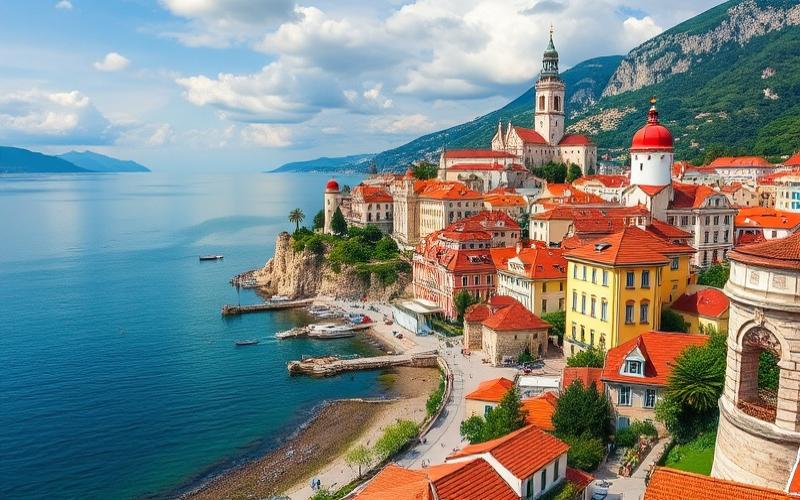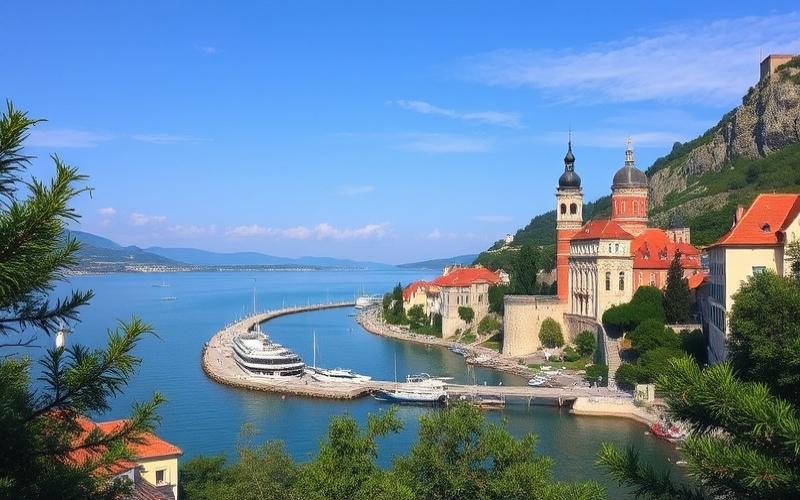
 Published on and written by Cyril Jarnias
Published on and written by Cyril Jarnias
Moving to a new country is a rewarding adventure, and learning the local language is one of the best ways to fully integrate.
In Croatia, where the charm of the Adriatic Sea meets a rich historical culture, speaking Croatian opens the door to an authentic immersive experience. Whether you’re fascinated by the cobblestone alleys of Dubrovnik or captivated by the lively markets of Zagreb, mastering the language basics can transform your stay.
This article explores the most effective methods and essential resources for expatriates eager to learn Croatian, making the process not only educational but also fun and rewarding.
Benefits of Mastering Croatian for Expatriates
Mastering Croatian offers expatriates major social, professional, and cultural benefits, facilitating integration and personal enrichment.
Social Benefits and Integration Facilitation:
- Communicating in Croatian allows for deeper connections with the local population and moving beyond the expatriate circle.
- Croats appreciate efforts to speak their language; this opens the door to warmer exchanges and invitations into family or friend circles.
- Participating in social life (cafés, traditional festivals, local clubs) becomes more natural and authentic.
- Examples: An American expatriate, even without understanding everything at first, gained the trust of his Croatian neighbors by sharing morning coffee, which led to invitations to meals and discovering local recipes.
Professional Benefits:
- Mastering Croatian provides access to more job opportunities, especially in non-tourist sectors or rural areas.
- The local language facilitates successful administrative procedures and access to local professional networks.
- Participating in Croatian or French-speaking professional events helps expand your network and accelerate integration.
Cultural Benefits:
- Understanding Croatian allows for deep immersion in local traditions (rituals, festivals, folklore).
- Croatian customs, such as family gatherings and specific greetings, are easier to grasp and respect.
- Participating in festivals, family meals, or cultural events becomes an authentic and rewarding experience.
- Example: During the Feast of Saint Blaise in Dubrovnik, expatriates speaking Croatian are often welcomed as full-fledged community members.
Personal Effects and Openness to New Experiences:
- Learning a difficult language like Croatian boosts self-confidence and a sense of accomplishment.
- Expatriates report increased well-being, better emotional adaptation, and reduced feelings of isolation.
- Being able to express oneself in Croatian fosters the discovery of new horizons, open-mindedness, and cultural curiosity.
| Benefits | Description | Examples/Testimonials |
|---|---|---|
| Social Integration | Deeper connections, warm welcome, family invitations | Sharing coffee, meals, local recipes |
| Professional Opportunities | Access to more jobs, easier procedures, expanded local network | Participation in local professional events |
| Cultural Immersion | Understanding traditions, participation in festivals, respect for customs | Feast of Saint Blaise, summer festivals, family meals |
| Self-Confidence | Personal accomplishment, emotional adaptation, reduced isolation | Sense of well-being, testimonials from integrated expatriates |
| Access to New Experiences | Discovery of Croatian culture, open-mindedness, personal enrichment | Adaptation to local pace, richer social life |
List of Concrete Benefits:
- Access to authentic interactions with Croats.
- Reduction of language barriers, especially outside major cities.
- Better understanding of social codes and local rituals.
- Possibility of being perceived as a full-fledged community member.
- Accelerated integration through participation in local events.
- Personal enrichment and development of intercultural skills.
Important:
Mastering Croatian is not essential in tourist areas or large cities, where English is common, but it becomes crucial for full integration, especially in rural regions and for accessing certain jobs or social circles.
Good to Know:
Mastering Croatian facilitates social and professional integration by strengthening communication with the local population and opening career opportunities; for example, an expatriate reported receiving a promotion due to fluency in Croatian.
Effective Learning Strategies Based on Learner Profile
Learning Strategies by Learner Profile
| Learner Type | Adapted Teaching Approaches | Recommended Tools |
|---|---|---|
| Auditory | – Active listening to podcasts, audio dialogues – Online courses focused on oral comprehension – Regular practice with native tutors – Oral repetition of new words and phrases | Pimsleur, Preply, Croatian podcasts |
| Visual | – Use of illustrated materials and flashcards – Apps with graphical interfaces and videos – Subtitling of audiovisual content – Observing signs, menus, labels in Croatian | Duolingo, Memrise, YouTube videos, Netflix |
| Kinesthetic | – Learning by doing: participation in local activities – Role-playing in real situations – Handling physical materials (cards, objects) – Writing and pronunciation exercises | Expat In Croatia method, workshops, clubs |
Specific Solutions for Expatriates in Croatia
Cultural Immersion:
- Frequenting local cafés and restaurants
- Participating in festivals, workshops, community events
- Discovering traditional cuisine and local customs
Language Exchanges with Locals:
- Joining clubs, associations, or French-speaking groups
- Organizing language tandems with Croats
- Taking private or group lessons with natives
Use of Digital Resources and Applications:
- Duolingo, Memrise for fun and flexible learning
- Preply for personalized lessons with a teacher
- Ling for interactive lessons and Croatian chat
- Specialized vocabulary programs for expatriates
Tips for Integrating These Strategies into Daily Life
- Get into the habit of reading signs and labels while shopping
- Add Croatian subtitles to your favorite shows or movies
- Dedicate a few minutes daily to a language app
- Note new words heard during daily interactions
- Set mini weekly goals (e.g., learn 10 useful expressions)
- Get involved in local life through community activities
Specific Challenges for Adult Expatriates
- Time management and motivation facing professional constraints
- Overcoming fear of mistakes and lack of confidence in speaking
- Adapting the method to one’s own pace and practical needs
- Dealing with cognitive fatigue related to acquiring a new language
Key Success Factors
Intrinsic Motivation:
Immerse yourself in local culture, value each progress, understand your own reasons for learning Croatian.
Personalized Goals:
Define clear, measurable goals adapted to your situation (e.g., converse with colleagues, understand the menu at a restaurant, participate in a local activity).
Summary Table of Language Integration Strategies
| Daily Strategy | Main Benefits |
|---|---|
| Learning via apps | Regular and fun progression |
| Immersion during local activities | Natural vocabulary acquisition |
| Exchanges with natives | Improved oral fluency |
| Workshops and community life | Networking and sense of belonging |
| Setting personal goals | Motivation and progress tracking |
Essential Advice:
Integrate learning into everyday life, value each interaction in Croatian, and remain open to cultural discovery to maximize progress and the joy of learning.
Good to Know:
Cultural immersion in Croatia can be optimized through regular exchanges with residents, while apps like Drops or Memrise offer exercises tailored to auditory, visual, and kinesthetic learners of Croatian. Setting personal goals and committing to them daily strengthens motivation and overcomes challenges faced by adults learning a new language.
Resources and Methods Adapted for Learning Croatian
Mobile Apps for Learning Croatian
- Duolingo: short lessons, personalized progression, interactive exercises.
- Memrise: memorization through spaced repetition, native videos, games.
- Babbel: structured lessons, grammar exercises, voice recognition.
- Lingodeer: detailed grammar, vocabulary, pleasant interface.
- Busuu: conversation exercises, active community, progress tracking.
- Anki: customizable flashcards for vocabulary.
- Tandem: exchanges with natives, text and video chat, corrections.
- LinGo Play: thematic vocabulary, courses for all levels.
- Mondly: games for learning to read, write, listen, speak; voice recognition.
- Ling, Drops, iTalki, Clozemaster: varied and interactive methods.
- Simply Learn Croatian, Croatian with Nemo, FunEasyLearn: phrases and words, thematic organization.
Recommended Books and Learning Guides
- Specialized textbooks for beginners, intermediate, and advanced learners.
- Croatian-French phrasebooks for travelers.
- Croatian grammar books with practical exercises.
- Bilingual Croatian-French dictionaries.
Online Platforms and Interactive Courses
- iTalki: private lessons with native teachers, language exchanges.
- Glossika: sentence repetition, audio immersion.
- Croatian courses on Lingoda, Udemy, Coursera.
- Forums and Facebook groups dedicated to learning Croatian.
Comparison of Main Resources
| Resource | Type | Strengths |
|---|---|---|
| Duolingo | App | Fun, progression, community |
| Memrise | App | Native videos, games, repetition |
| Babbel | App | Grammar, voice recognition |
| iTalki | Platform | Individual lessons, exchanges |
| Grammar books | Book | Structured approach, exercises |
| FunEasyLearn | App | Vocabulary, multi-language |
| Glossika | Platform | Audio immersion, sentences |
Differences and Similarities Between Croatian and Other Slavic Languages
Croatian belongs to the South Slavic group (with Serbian, Bosnian, Slovenian). The Croatian alphabet uses the Latin alphabet, unlike Russian or Serbian (Cyrillic). Lexical and grammatical similarities with Serbian and Bosnian. Differences in vocabulary, pronunciation, and some grammatical rules among Slavic languages. Declensions and conjugations are present in all Slavic languages, but forms vary.
| Slavic Language | Alphabet | Similarities with Croatian | Main Differences |
|---|---|---|---|
| Serbian | Latin/Cyrillic | Vocabulary, grammar | Alphabet, some words |
| Slovenian | Latin | Geographically close | Pronunciation, vocabulary |
| Russian | Cyrillic | Grammatical structure | Alphabet, vocabulary, declensions |
| Polish | Latin | Conjugation, declensions | Phonetics, vocabulary |
Effective Learning Methods
- Full immersion: language stay, travel to Croatia, daily life in local context.
- Language exchanges: tandem, conversation with natives online or in person.
- In-person or online courses: language schools, universities, private lessons.
- Use of apps and platforms for autonomous and interactive learning.
Practical Tips for Integrating Croatian into Daily Life
- Listen to Croatian music regularly to get used to sounds and enrich vocabulary.
- Watch Croatian movies or series with subtitles to improve oral and written comprehension.
- Participate in local or online conversation groups.
- Read articles, newspapers, or simple books in Croatian.
- Keep a personal journal in Croatian to practice writing.
- Change your phone or computer language to Croatian for passive immersion.
- Use chat apps to exchange daily with native speakers.
Key Takeaway
Learning Croatian is facilitated by the diversity of digital and traditional resources. An approach combining immersion, regular practice, exchanges, and use of varied materials promotes rapid and lasting progress.
Good to Know:
Explore apps like Duolingo or Babbel to learn Croatian, and participate in language exchanges to practice; note that Croatian shares similarities with Serbo-Croatian, facilitating learning for those familiar with other Slavic languages.
Basic Vocabulary and Essential Phrases in Croatian
| English | Croatian | Simplified Pronunciation |
|---|---|---|
| Good morning | Dobro jutro | DOB-ro you-tro |
| Good day | Dobar dan | DO-bar dan |
| Good evening | Dobra večer | DO-bra vetch-er |
| Hi (informal) | Bok / Bog | Bok / Bog |
| Goodbye | Do viđenja | Do vee-JEN-ya |
| Thank you | Hvala | HVA-la |
| Please | Molim | MO-leem |
| Yes | Da | Da |
| No | Ne | Ne |
| Excuse me | Oprostite / Izvinite | O-pro-stee-te / Ee-zvee-nee-te |
| I don’t speak Croatian | Ne govorim hrvatski | Ne go-VO-reem HR-vat-ski |
| Can you help me? | Možete li mi pomoći? | MO-zhe-te lee mee PO-mo-chee |
| Where is the train station? | Gdje se nalazi kolodvor? | Gdye se NA-la-zee KO-lod-vor |
| Where are the restrooms? | Gdje su toaleti? | Gdye soo toa-LE-ti |
Other Useful Words
- Yes: Da
- No: Ne
- How are you?: Kako ste?
- I’m lost: Izgubio sam se (male) / Izgubila sam se (female)
- How much does it cost?: Koliko košta?
- The check, please: Račun, molim
- I don’t understand: Ne razumijem
- Where is the nearest ATM?: Gdje je najbliži bankomat?
Explanations on Pronunciation and Importance of Basic Vocabulary
Croatian pronunciation is largely phonetic: each letter is pronounced, and there is no complicated stress. The letters “č”, “ć”, “š”, “ž”, “đ” have specific sounds:
- “č”: like “ch” in “church”
- “š”: like “sh” in “shoe”
- “ž”: like “s” in “pleasure”
Mastering these essential expressions allows for warm contact, asking for help, navigating public spaces, and showing respect to residents. It’s a major asset for integration, facilitating administrative procedures, or simply daily exchanges.
Tips for Daily Practice
- Repeat a handful of words or expressions daily in real contexts (in stores, transport, cafés…).
- Note in a notebook or your phone the phrases you use most often.
- Practice with locals, even imperfectly: Croats appreciate the effort and are generally encouraging.
- Watch short videos in Croatian (YouTube, social media) to accustom your ear.
- Associate each word with a concrete experienced situation to reinforce memorization.
Useful Resources for Progress
Mobile Apps:
- Duolingo (Croatian)
- Memrise
- 50Languages
- Mondly
Dictionaries and Online Tools:
- Glosbe (fr-croate)
- Google Translate (with audio option)
- French-Croatian lexicon on encroatie.com
Supplementary Materials:
- Phrasebooks (Lonely Planet, Assimil)
- Facebook groups for expatriates in Croatia for daily exchanges
✦ Using this vocabulary daily is key to successful integration and authentic interactions in Croatia. ✦
Good to Know:
Learning basic words like “bok” (hello), “hvala” (thank you), “molim” (please) and phrases like “Ne govorim hrvatski” (I don’t speak Croatian) can greatly facilitate your integration; use apps like Duolingo or online dictionaries to practice daily and improve pronunciation.
Disclaimer: The information provided on this website is for informational purposes only and does not constitute financial, legal, or professional advice. We encourage you to consult qualified experts before making any investment, real estate, or expatriation decisions. Although we strive to maintain up-to-date and accurate information, we do not guarantee the completeness, accuracy, or timeliness of the proposed content. As investment and expatriation involve risks, we disclaim any liability for potential losses or damages arising from the use of this site. Your use of this site confirms your acceptance of these terms and your understanding of the associated risks.
























